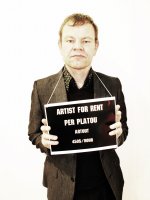
Project 3 / ARTOUT Artist Escort Service
Sunday 18 September 2011, by
”No Soul For Sale” was printed on Tate Modern’s invitation for its 10th anniversary. Perhaps we are not selling our ‘immaterial labour’ (Maurizio Lazzarato) so easily yet we often treat our life as creative projects (Luc Boltanski). Chris Dercon, director of Tate Modern, describes creative practitioners today as zombies and vampires due to the precarious working conditions we face and endless free services we are willing to offer.
When self-exploitation seems to be the norm as a survival strategy, how is it possible for cultural workers to say ‘no’?
Without existential security, what about our ability to challenge?
The law of the capitalist market with its emphasis on the ever-narrowing specialization of labor and maximization of profits invites artists to reinvent themselves over and over in order to escape the market-imposed limits to their identity. This limited identity confines artists to seek satisfying the ruling class demand for the special commodity fetish known as Art and reproduce institutionally-defined ideology of culture. In both cases the producer and the consumer of Art are limited in their freedom by the traditional modes of material exchange.
We, at ARTOUT, believe that art is an open concept and artistic praxis is the process of becoming that corresponds to the totality of individual temporality. Artistic creativity results from the dialectical relation between the acceptance of the market as the underlying principle of social reality, and the need to escape its imperatives of obedience and consensus; its locus is the individuality of the artist. The artist plays the messenger and the message, the self-medium that finds its legitimacy through the charismatic negation of conventionality.
We believe that the individuality of the artist is far more significant than the material end-product of the artist’s labor. We are extending the limits of the traditional market-model to recognize the artist as the self-defined commodity whose value resides in the immateriality of artist’s creative becoming. Spending time in the company of the artist is a new "creative" commodity exchange; it reveals power relations within the existing artist-patron paradigm and leads to the mutual liberation of both artists and art patrons from the condition of simple material production and accumulation to the next level of the direct creative exchange within the dominant capitalist art market paradigm.
For more information, please visit www.artout.org